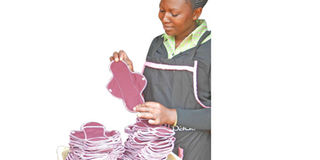A chance to make a living

Irene Nakayima, the production manager, shows off a part of the pad that is stuck on the panty. The whole ensemble is washable. Courtesy Photo.
What you need to know:
Following Sophia Klumpp and Paul Grinvalds’ advice, Grace Kenganzi visited their workshop in Masaka and got testimonies from three of the more than 20 girls who are employed by the company. Here are their stories;
Judith Nassaka, 24
I joined Afripads in 2009. I heard about the company from Dan, a friend of Sophia Klumpp and Paul Grinvalds who used to take care of my sister. The only skills I had were that I knew how to use scissors and so I asked for a job and I was put in charge of cutting the materials used according to the designs of the pads. At the company, I saw women who had gone to technical schools working there and I felt proud to be working with them since I did not reach their level of education. I stopped studying in Senior Six since I could not afford the fees for education beyond that. And since I wanted to help out my mother with my siblings, I started doing odd jobs around the village like washing people’s clothes and tutoring young children in school work. Since I started working here, I have improved on my skills to the extent that I am now in charge of repairing sewing machines on top of helping out in making the pads. I am not comfortable with telling you how much money I get a month but I can assure you that it is good since I am able to take care of my family and baby. And most importantly, I don’t think I will ever find another job as good as this one.
Hajara Makula, 20
While I was taking sewing classes in Masaka town, I always dreamed of using my skills to sustain me. However, many people always spoke negatively about tailoring, saying that very many women had already taken it up and therefore the town did not need any more tailors but I continued doing it. Then, in June 2010, my friend who was already working for Afripads told me that they were looking for someone who knows how to sew, so, I applied. When I joined, I learnt the design of the kits and the importance of following it because it is important to have a quality product so that customers are happy. I am so happy that I stuck to my dream because now I earn money which means that I can take care of myself while helping my siblings.
Irene Nakayima, 25
I started out at Afripads as a supervisor in July 2009. My husband was friends with Paul and Sophie and I visited them with him one day. They were looking for someone who lives in Masaka and can help to look after things when they were not around and I said I was interested. I was recently promoted to production manager so working here has helped me become someone I never thought I would become. I am so proud of working here not only because of the money, but because what we do changes the lives of many girls in Masaka in two ways. The first is that the company employs girls from around Masaka who start out with very little or even no experience and these girls get a way of taking care of their families. The second is that we are able to help girls who used to miss school during their periods. Where girls used to use rugs, toilet paper and sponges, they now have these menstrual kits. I know what these girls were going through because I also grew up in a poor family where I once used sheets and always dreaded the teacher calling me to the front to write on the blackboard, though this never made me miss school. At least my father could afford to buy disposable pads after some time though I had to share them with my sisters. For some girls, this is not an option and so the kits come in handy.
And teachers in the schools we have worked with notice the difference when some girls make it to class for the entire term. And the feedback from the girls is even better because they always sound happy about not having to worry about that time of the month. Some people think the kits are difficult to maintain since they involve washing them thoroughly but the only people who complain about this are those who can afford to buy the disposable pads.




